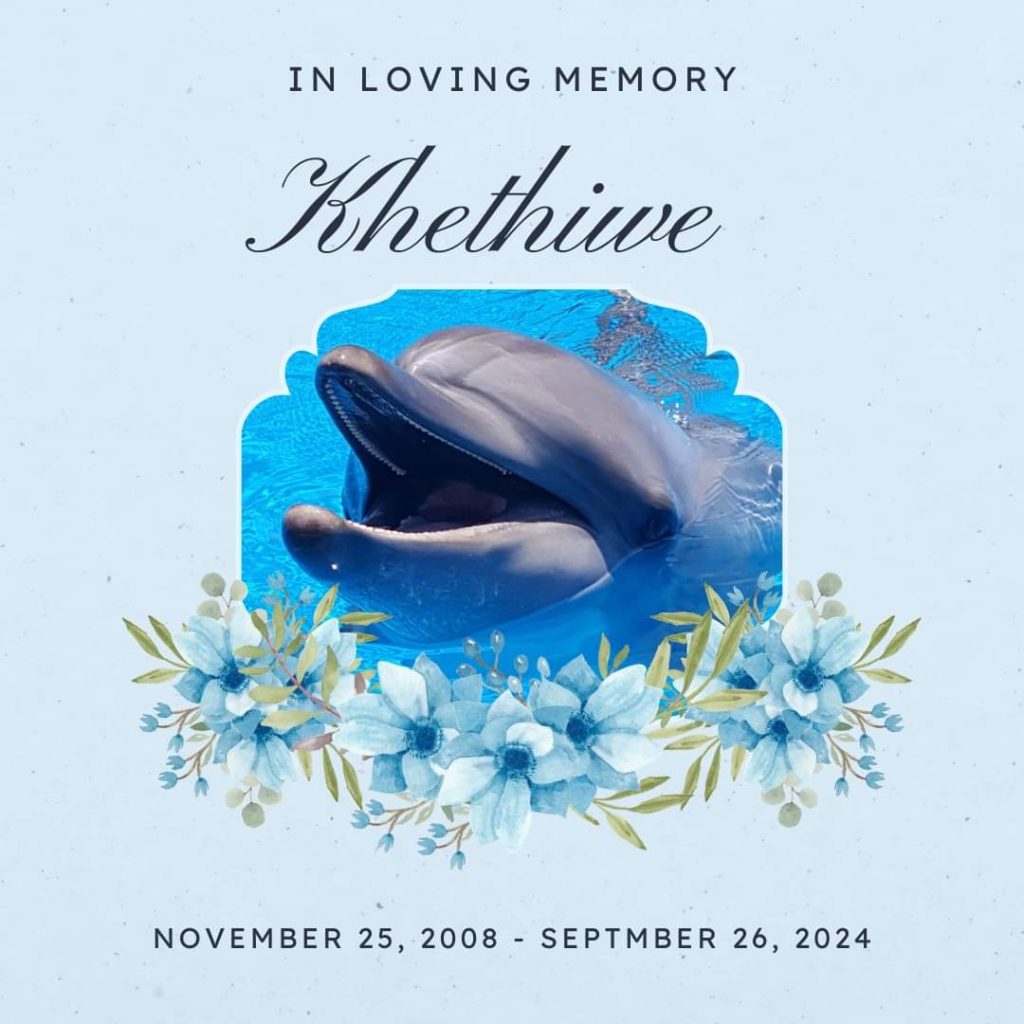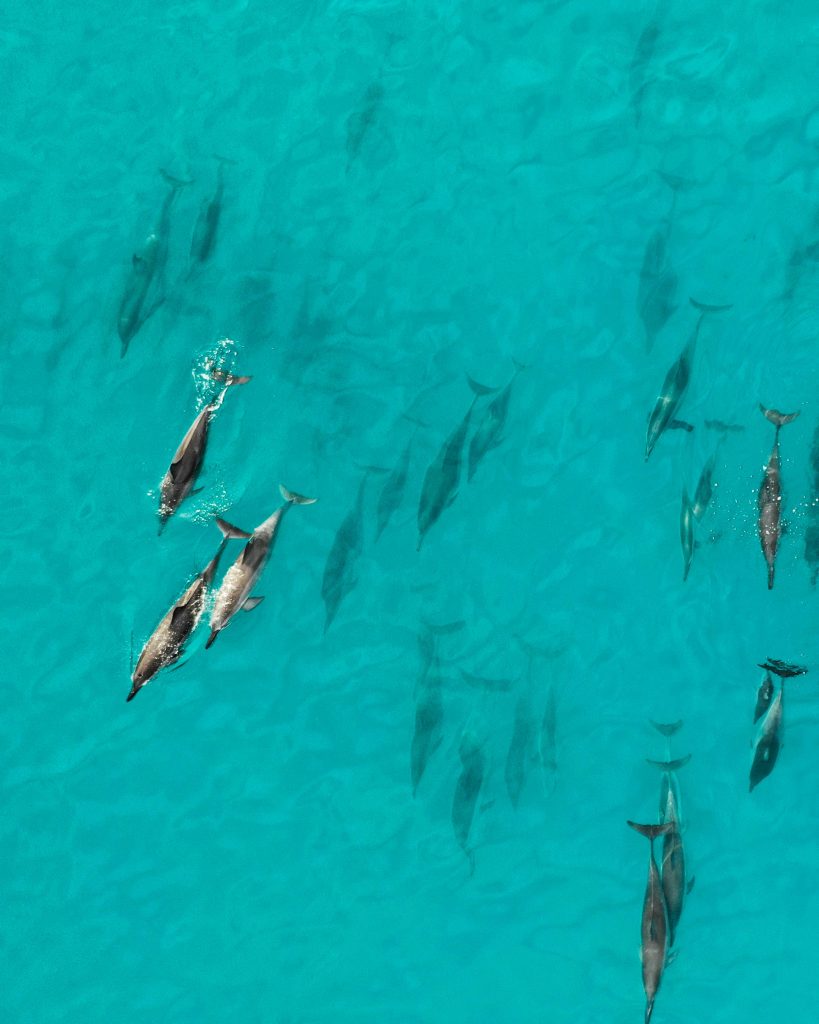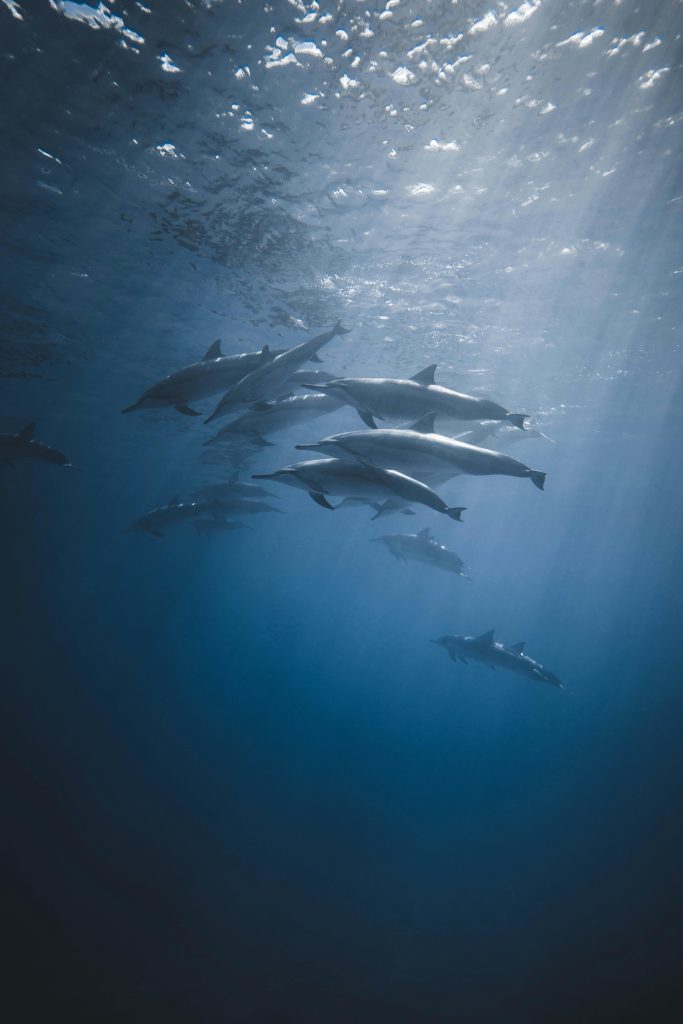
A CALL FOR CHANGE, A TIME TO EMPTY THE TANKS
Since the recent passing of Khethiwe, the youngest dolphin at uShaka Marine World, the animal rights world is faced with not just sadness, or anger, but a duty to highlight the ethics of keeping marine mammals (and other wildlife) in captivity.
Born to parents Gambit and Frodo, Khethiwe spent her brief 16 years confined within the walls of a marine park, performing tricks for crowds. Her name, meaning “the chosen one” in isiZulu, serves as a sad reminder of the expectations placed upon her—chosen for captivity, rather than the freedom that her species was meant to enjoy, as Beauty Without Cruelty writes.
At just 16 years old, this captive-born dolphin slipped away, her life a sad reminder of the ocean depths she never knew, the waves she never felt, and the freedom that remained forever out of reach. My eyes fill with tears every time I think about her death and as I write this article I hope to see a world, in my lifetime, where animals are not used for entertainment!

Sixteen years old is considered young for a bottlenose dolphin female to die. Her cause of death is not yet revealed. In the wild, bottlenose dolphins typically have a lifespan of around 40 to 60 years, with some individuals living even longer in captivity. Factors such as health, environmental conditions, and human impact can influence their lifespan, but a 16-year-old dolphin would generally be expected to live much longer.
Dolphins are highly social animals, known for their complex social structures and strong bonds within their pods. These intelligent creatures thrive in groups, relying on social interactions for communication, cooperation, and emotional support. Their playful behaviours and coordinated hunting strategies demonstrate the importance of community in their lives. Living in close-knit pods allows dolphins to share resources, protect one another from predators, and teach their young essential survival skills. This social nature is crucial for their well-being, highlighting how interconnectedness with their kind is vital for their survival and happiness.
Toni Brockhoven, Chairperson of Beauty Without Cruelty (BWC), remarked, “Khethiwe’s life and death should be a wake-up call. We cannot keep hiding behind the idea that animals in captivity are happy just because they seem to entertain us. Her life was not her own—it was a performance for human amusement, and that’s something we need to confront. Her death is heartbreaking, but what’s even more devastating is that we still allow animals like Khethiwe to live entire lives in captivity for the sake of human entertainment. It’s time we face the reality: these animals suffer, and we need to change.”
Khethiwe’s untimely death at such a young age highlights the urgent need to end the practice of using animals for entertainment. While facilities like marine parks and zoos often claim to care for their animals, it is a terrible justification to keep them confined. Dolphins are intelligent, social beings that thrive in their natural environments, swimming great distances and engaging in complex social interactions that cannot be replicated in captivity. I believe that if you truly care about their needs, then you don’t keep them captive or support captivity. Is it acceptable to keep a child in a cage because they are well cared for? That is an ignorant argument from fools. Khethiwe never got to experience what she was meant to! For anyone who has any compassion, this should be heartbreaking!
Dolphins like Khethiwe, spend their lives performing repetitive routines in confined tanks. It is undeniable that the stress of captivity can lead to severe physical and psychological issues, including depression and aggression. The restrictions placed on these creatures rob them of their natural behaviours—swimming freely, socializing, and hunting in the depths of the ocean.
Marine mammal specialist Naomi Rose from the Animal Welfare Institute has long called for an end to dolphin captivity. “Captivity limits their natural behaviours, causing mental and physical stress. The environment in marine parks is entirely artificial and unnatural for dolphins.” Khethiwe’s life was a testament to this harsh truth. Confined to a tank, her instincts were suppressed, and her existence was reduced to mere entertainment for humans.

Also, read about the bad excuses for giving animals away.
As we mourn Khethiwe’s passing, it is crucial to understand that her story is not an isolated incident. Many animals, from dolphins to elephants and tigers, are held in captivity for the sake of entertainment. Zoos, petting farms, animal rides, and circuses perpetuate a cycle of exploitation, where the lives of sentient beings are commodified for human enjoyment. The ongoing support for these entertainment parks and industries directly contributes to the captivity of these animals because if it pays, it stays. Every ticket purchased and every attraction visited funds an industry that prioritizes profit over the true needs of its inhabitants. By choosing to attend these facilities, individuals inadvertently endorse a system that exploits sentient beings for entertainment, perpetuating confinement and potential suffering. This financial support allows parks to maintain their operations, creating a false narrative that animals are thriving when, in reality, they suffer in isolation. Do you remember how much you loved lockdown? Didn’t think so……
The claim that marine parks and zoos provide significant educational value is another common misconception. While seeing animals up close may seem informative, true education goes far beyond mere observation. A four-year-old can tell you about dinosaurs they’ve never seen, demonstrating that knowledge can be acquired through books, documentaries, and other resources without the need for live animals in captivity. Learning about dolphins, elephants, and other creatures in their natural habitats offers a much richer understanding of their behaviours, social structures, and ecological roles.
Documentaries and virtual experiences can provide authentic insights into their lives, fostering a deeper appreciation for their existence and the challenges they face in the wild. Instead of teaching empathy and respect for wildlife, captivity often reinforces a false narrative that these animals are mere entertainment, or commodities, detracting from the urgent message of conservation and the importance of protecting their natural environments.

Also, read more about the circus captivity.
Khethiwe’s life and tragic death force us to confront uncomfortable truths about our values and practices. Should dolphins, inherently meant for the vastness of the ocean, be confined to small tanks? Is this what we truly want for animals we claim to care for? These beautiful creatures do not belong in captivity. They are deprived of the world they were meant to inhabit.
Consumers need to recognize the impact of their choices and consider alternatives that promote wildlife conservation and education without compromising animal welfare. By choosing to support sanctuaries (not engaging directly with wildlife) and reputable rescue organizations instead, we can advocate for a future where no sentient creature is locked away for human amusement, ultimately driving home the urgent need for systemic change in how we treat animals.
We need to push for a future where no dolphins (or other wildlife) are born into captivity, where no creature is forced to endure a life confined to cages and tanks. Animals are not here for our entertainment; they are living beings deserving of the freedom to exist in their natural environments.
Let Khethiwe’s life inspire us to take action. The world is evolving, and our understanding of animal rights must evolve with it. The time has come to empty the tanks and end the practices that keep sentient beings in confinement. Together, we can advocate for a world where animals can thrive in their natural habitats, free from the constraints imposed by human entertainment.
In honoring Khethiwe, let us commit to creating a better future for all animals. Let’s ensure that future generations of dolphins swim freely in the oceans, living lives rich with the natural behaviours that define their existence. Choose compassion over entertainment. Don’t be captured by captivity.
SWIM FREE KWETHIWE!
WHEN YOU KNOW BETTER, DO BETTER!